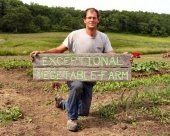Well, there are two ways of thinking on this. Do you A. want to be prepared for a temporary glitch in the grid (natural disaster, electrical grid issue, pandemic, temporary disruption in fuel availability etc) or, B. do you want to live a prepared sustainable lifestyle?
So, 3 months of food is a great start for scenario A. The basic, take care of yourself if something bad, but temporary happens. Batteries, weather radio, meals-ready-to-eats, canned goods, toilet paper, drinking water, pack of cards. Don't forget the manual can opener!!!
However, it really depends on how long you think you will need to feed yourself and your family. If you live a lifestyle that you support yourself with little outside help (rice, coffee, sugar, salt) then you won't need to panic is something small or medium happens. If something big is on it's way a SHTF scenario, then you need to think more about security of you and your garden.
I have been moving towards sustainability for more than 10 years. Really all my life, if I would have just listened to my Grandmother all those years ago. It's been a slow change, and I'm not 100% there, but I'm working on getting the garden soil in better shape to produce more for me.
The first thing to do, before you go and spend that $200 in food is know where and how to store food. It isn't about storing some canned goods and letting them sit until you need them, you need to rotate your stock and you need to know what you are up against with food storage.
The best place is cool and dry and dark. A north corner of a basement is ideal. But, surf around the web and you will read all the inventive ways people store food. You want to prevent rodents, insects and molds. Hence cool and dry. Mice will chew through anything but glass, so everything I store is in glass. I also have found a type of plastic tub, very popular in the big box stores that has a lid that isn't just on top, but it fits down a little. I used to buy them at Wal-Mart, but they don't carry them anymore, so I have to pay more to find them (made by Rubbermaid) at Lowe's. When I used different tubs to store things when we were moving I found others with mice droppings inside, but these never had mice inside them. If I use the vacuum sealer, I then store everything in these tubs.
Insects will infest anything in a bag or box eventually. Once you have flour weevils or pantry moths they are hell to get rid of. Again, glass and rotate-rotate-rotate your stock.
Mold. Mostly from damp conditions and improperly canned foods. Keep your pantry clean and before storing ANY home canned foods always wash the finished jars with a bleach and soap or vinegar and soap solution.
Next, before you spend ANY money, sit down with paper and write down how your family eats. You won't find any use from 25-pounds of dried black beans if you don't know how to cook them and no one likes to eat them. If you prefer rice over pasta, then stock up on rice. If no one likes rice, the stock up on pasta. Remember don't store the pasta in the cardboard box, but transfer to a gallon glass jar with a few bay leaves in the jar to help keep away any buggies.
So, do you know how to cook? If I gave you a head of cabbage, an onion and some dried sausage can you make dinner? If not, then maybe your stored food needs to sway toward low-tech food prep. In the meantime, learn to cook, your options will be more open if you can buy bulk ingredients and turn them into different meals with fresh gathered from the garden.
Okay, now go shopping. Make sure you pick up some mason jars and keep your dried goods in them. If you can re-use large gallon glass jars, that is best. I buy the glass jars with pickles in them. I don't really like pickles, but my mother LOVES them. I slice up the pickles for her and then wash the jar and let it air out so everything doesn't taste/smell like pickles. My husband thought I was nuts until I showed him how much it would cost, with shipping for empty gallon glass jars.

Once you have things purchased and stored, be sure to rotate. Yes, you still eat your stored foods, and you buy some more so you have a supply on the shelf, but you have fresh coming in and being placed in the back. This way you aren't just putting it on a shelf and expecting it to be fresh and tasty 10 years from now.
If you are looking at a lifestyle, the best food storage (food to space ratio) is de-hydrated food. It also doesn't need freezer space. You need a food dehydrator and some knowledge. Google searches will bring you to sites and people who have some great knowledge to share for free. A vacuum sealer is next and learn about gardening. If you can't garden, get to know local farmer markets to stock your shelves for winter.
If you are interested in gardening, then there is an author who grows year round in Maine, Elliot Coleman. It can be done!
If you are going in full force, don't forget to stock up on sanitation. Soap, vinegar, salt, lemon juice in bottles, bleach. Food is great, but if you can't clean up and kill germs then you can make yourself sick.
Google and you will be amazed how many people are freely giving ideas on this subject. Sometimes the red pill is the hardest to swallow. Make lists and welcome.
Tami














